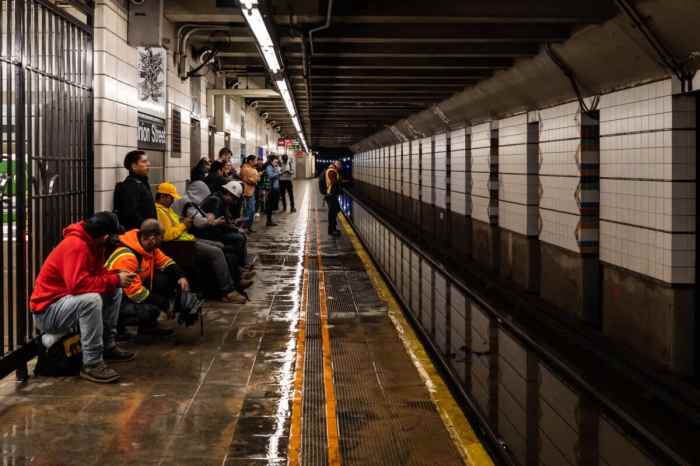 Bill Johnson, from North Philadelphia, uses the computers at the Free Library on Logan Square. He uses the library regularly, and says, “The librarians are very helpful. Without them, this place is just a building.” Credit: Charles Mostoller/METRO
Bill Johnson, from North Philadelphia, uses the computers at the Free Library on Logan Square. He uses the library regularly, and says, “The librarians are very helpful. Without them, this place is just a building.” Credit: Charles Mostoller/METRO
Gail Dickinson can’t take credit for the analogy.
“But libraries used to be described as a grocery store,” said Dickinson, who’s in town for the American Library Association’s Midwinter Meeting. “Where you went and bought things to make something somewhere else.”
But there’s been a shift, she said. Patrons are now mixing books with technology and they’re doing it inside the libraries instead of inside their homes.
“Now,” she said, “a library has become a kitchen.”
Dickinson, president of the American Association of School Librarians, is joining the several thousand library professionals attending the ALA meeting at the Pennsylvania Convention Center, which ends today after the five-day event.
The main topics address the deterioration of school libraries, the closing of public libraries, budget cuts and how to bridge the digital and generational divides.But the future is already here. Libraries are becoming classrooms.
Barbara Stripling, president of the American Library Association, said she sees students who are excited about technology, “but, not necessarily the opportunity to play with technology.”
For the younger generation, libraries are providing opportunities to use iPads and advanced programs. Patrons are creating videos and podcasts, and reading books and magazines which offer step-by-step instructions.
“It’s very low-risk in the library environment, it’s not for an assignment,” she said. “And yet it’s very empowering.”
And what about the Millennials?
Siobhan A. Reardon, president of the Free Library of Philadelphia, said the challenge is creating the environment.”Millennials are gadget oriented.”
They’re highly social people, they’re incredibly engaged and they love to share this excitement of learning, she said. And the gadgets are their tools.So libraries have issues attracting Millennials because they’re not about the book.
“It gets back to that conversation around creating the experience,” she said.
Reardon said Philadelphia’s challenge is literacy — digital literacy. Not surprisingly, in a city of roughly 1.5 million people with 400,000 below the poverty line, a fairly large portion is technology challenged or “early literate.”It ties in to the overall role of the library’s transition to become more community-centric.
“It’s all about civic engagement, all about the experience of the library,” she said. “And having the books and the buildings more as the tools to learning and engagement and not about the reason we exist.”
So, what’s the future?As always, it’s in the youth.It means shoving books aside, and not having as many books, and creating flexible spaces where young people can rearrange furniture, access different technology — a space to collaborate and a space to be alone, Stripling said.
“What we’re trying to do is give our youth an opportunity to participate in the environment, in the creation of ideas and in collaboration with others,” she said.
Self-evident:Declaring the right to library
Philadelphia is a battleground in the revolution against child literacy.
“Philadelphia is an example of a community that is really struggling in the school library realm,” said Stripling.”Most of your children in Philadelphia are without school library services. And what it’s doing is marginalizing them for the rest of their lives.”
On Monday afternoon, students, parents and advocates signed the ALA Declaration for the Right to Libraries inside the Logan Room at the Library Company of Philadelphia as part of the ALA winter conference. The ceremonial signing shows support for the survival of libraries throughout the country. Declaration signings have been held nationwide since the first signing in July 2013.
 A librarian signs the Declaration for the Right to Libraries at the Library Company of Philadelphia, at an event organized by the Alliance for Philadelphia Public Schools on Monday. Credit: Charles Mostoller/METRO
A librarian signs the Declaration for the Right to Libraries at the Library Company of Philadelphia, at an event organized by the Alliance for Philadelphia Public Schools on Monday. Credit: Charles Mostoller/METRO
According to the ALA, more than 135,000 of Philadelphia’s students no longer have access a certified librarian, or even a library in some instances because of budget cuts. Only 16 certified school librarians remain. In 1991, there were 176. About 93 percent of schools within the city do not have librarians.
“They’re not learning the information skills, the inquiry skills, the way to navigate in a world of technology and information that’s going to enable them to be successful,” she said. “Personally and academically and in their jobs.”





























